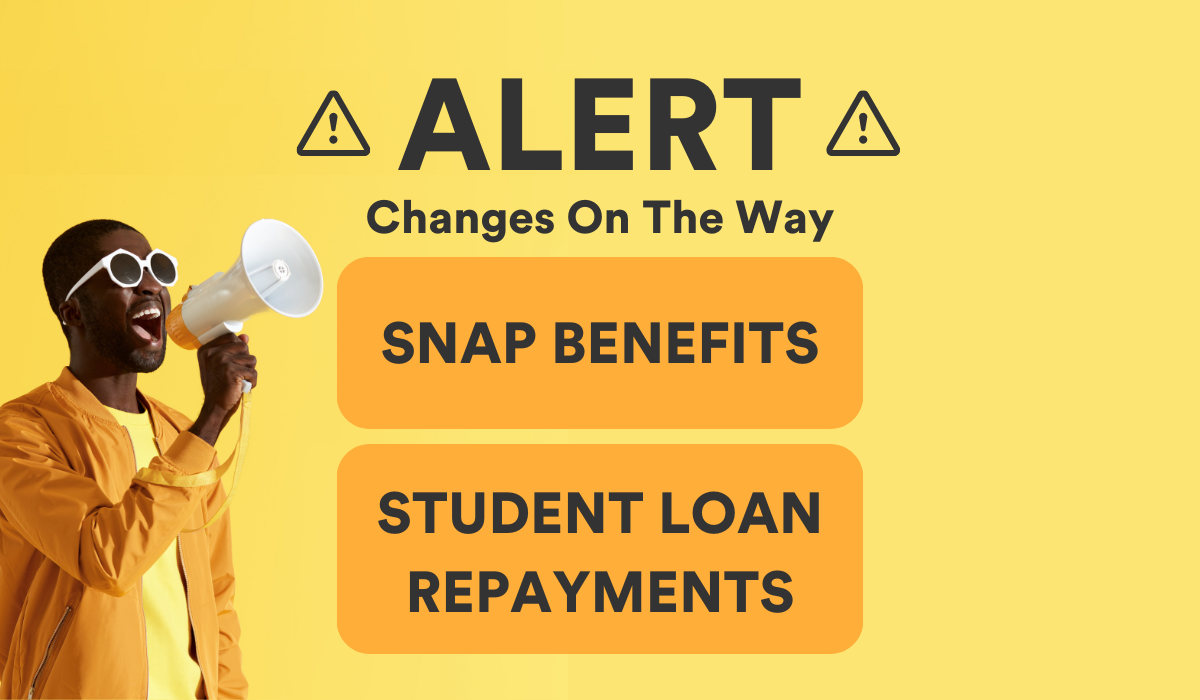Changes Ahead: Student Loan Repayment & SNAP Benefit Updates May Impact Your Finances

You were probably inundated this spring with debt ceiling discussions on the news and social media. But what is a debt ceiling, and how does it affect your personal finances?
Debt Ceiling Background
Put simply, the debt ceiling is the limit of how much the US Treasury can borrow. This limit has been raised many times over the years so the US government can meet its growing financial obligations.
President Biden signed the “Fiscal Responsibility Act of 2023” (AKA the Debt Ceiling Bill) in June to suspend the nation’s debt limit through January 1, 2025.
So how does the Debt Ceiling Bill affect you and your finances? Two programs are changing due to the debt ceiling negotiations: student loans and SNAP benefits.
Student Loan Repayment Background
While the Supreme Court has yet to rule on President Biden’s student loan forgiveness plan, the debt ceiling negotiations will impact federal student loan borrowers across the US.
During the COVID-19 pandemic, federal student loan payments were suspended, and the interest was set to 0%. That pause has been extended nine times by former President Trump and President Biden.
In November of 2022, President Biden announced he would not renew the student loan pause and payments would resume sometime in 2023.
Learn more here: What’s in Biden’s Student Loan Forgiveness Plan and How Does it Affect You?
The Debt Ceiling Bill has solidified Biden’s claim that student loan payments will resume.
Summer 2023 Changes to Student Loan Repayments
The Debt Ceiling Bill states student loan payments will resume 60 days after June 30, 2023.
This means the pause on student loan payments will expire at the end of August 2023. Borrowers with federally held student loans should factor their payments back into their budgets in September.
Student loan interest will start accruing again in September, with payments resuming one month after.
What can you do to prepare for the student loan repayment changes?
- Confirm the contact information for your loan servicers and your repayment plan.
- Keep an eye out for communication from your loan servicer.
- See if your loans can be discharged because you qualify through public service, disability, or college wrongdoing.
- Check to see if your state offers any other protections for borrowers.
- Consider applying for an income-driven repayment plan if find yourself unable to make your payments. These plans will base your payments on your income and might make it easier for you to begin to pay back your loans. Click here to learn more about income-driven repayment plans, and find out if it’s a good option for you.
It’s important to note two things about the Debt Ceiling Bill:
- While repayments will resume, the overhaul to the income-driven repayment plan was not affected by the Debt Ceiling Bill and is expected to be implemented later in 2023.
- This bill has no bearing on President Biden’s student loan forgiveness proposal. Whether or not the student loan forgiveness can go forward will be determined by the US Supreme Court by the end of June 2023.
Changes to SNAP Benefits
Another benefit program, the Supplemental Nutrition Assistance Program (SNAP), has also been affected by the Debt Ceiling Bill.
SNAP is a food assistance program providing food to low-income individuals, working families, the elderly, and individuals with disabilities. The Debt Ceiling Bill has modified the work requirements portion of SNAP.
Before the Debt Ceiling Bill, people ages 18-49 without dependents could only receive SNAP benefits for three months during a 3-year period unless they could show they were working or participating in another qualifying activity at least 20 hours per week.
With the passage of the Debt Ceiling Bill, the SNAP work requirement is expanding in phases to include people ages 50-54.
That means by 2025, those ages 18-54 without dependents will only qualify for three months of SNAP benefits in a 3-year period unless they can show that they are working or participating in another qualifying activity for at least 20 hours per week.
There are a few exemptions to the new work requirements under the Debt Ceiling Bill. Veterans, those experiencing homelessness, and those under the age of 25 who were previously in the foster system will not have to meet the new work requirements.
If you receive SNAP benefits, be sure you understand the new requirements and how your benefits will be affected.
In both cases, as these changes are implemented, make sure you factor the impacts into your budget.